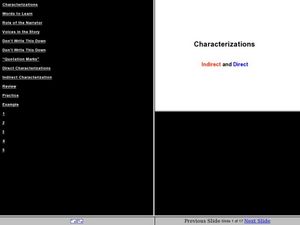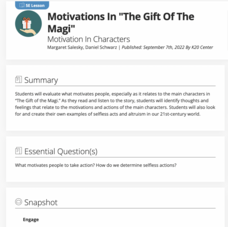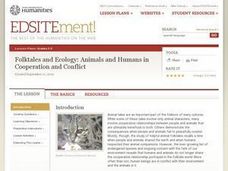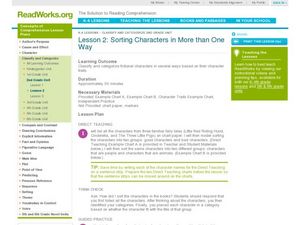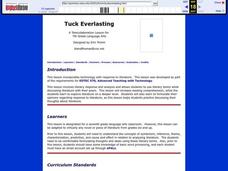Curated OER
Characterization in Literature
High schoolers discover characterization techniques and methods. In this characterization lesson, students choose favorite fiction characters and discuss what makes a character come alive. High schoolers then describe a family member or...
Curated OER
"Three Shots": Ernest Hemingway's Nick Adams
Analyze characterization in literature. Readers use "Three Shots," from The Nick Adams Stories by Ernest Hemingway and complete classroom activities that require them to apply literary analysis techniques. They write their own short...
Curated OER
Unsent Letter: Characterization in Briar Rose
After completing Jane Yolen’s Briar Rose, class members assume the voice of Gemma and craft a personal letter to her granddaughter telling Becca how she feels about Becca’s actions and the discoveries at Chelmno. Complete directions for...
Curated OER
Characterizations: Indirect and Direct
Connect literature to narrative writing by researching descriptive writing techniques. Elementary and middle schoolers identify the importance of a narrator and voice in the storytelling process. They read writing samples and identify...
Prestwick House
Analyzing Multiple Interpretations of Literature
There is a reason why an Oscar is given each year for the Best Adaptation Screenplay. Adaptations are the focus of an exercise that asks class members to compare a work of literature with a least one adaptation of the work into a...
K20 LEARN
Lord of the Flies Unit, Lesson 8: In The End
To end the unit, groups use the Honeycomb Harvest strategy to show connections among a character, symbols, and themes in the novel and then create an Anchor Chart for the character that includes a symbol that best represents him. They...
Indiana University
World Literature: "One Evening in the Rainy Season" Shi Zhecun
Did you know that modern Chinese literature “grew from the psychoanalytical theory of Sigmund Freud”? Designed for a world literature class, seniors are introduced to “One Evening in the Rainy Season,” Shi Zhecun’s stream of...
Curated OER
Come Fly with Me . . . Open a Book: Travels through Literature
This detailed overview of a curriculum unit suggests using travel literature to engage and stimulate your third graders’ interest in reading. The suggested reading list includes fiction and non-fiction materials and offers urban children...
Curated OER
Cheerful Hearts and Willing Feet
Students explore characterization in Little Women. In this literature lesson, students participate in written analysis and research in order to explore Alcott's characterization in the novel.
PBS
Figurative Language and Foreshadowing in The Outsiders
S.E. Hinton's The Outsiders is still relatable to teenagers today, even though it was written more than 50 years ago. Explore how the figurative language of the story works to establish characterization, and how foreshadowing lays out...
K20 LEARN
Motivations In "The Gift Of The Magi": Motivation In Characters
O. Henry's short story, "The Give of the Magi," launches a study of what motivates people to act as they do. Class members identify what they believe are the motivations of the characters in O. Henry's tale and then craft a one-page...
Curated OER
Folktales and Ecology: Animals and Humans in Cooperation and Conflict
Story elements such as conflict, character analysis, resolution, and moral are discussed and charted as elementary children read folktales involving animals. An element of science is also introduced as learners discover what a keystone...
Southern Nevada Regional Professional Development Program
Close Reading in the Classroom
Close reading is key to the analysis and interpretation of literature. A close reading of the title and the epigraph of “The Love Song of J. Alfred Prufrock” offers readers an opportunity to examine how even single words or names can...
Curated OER
Sorting Characters in More Than One Way
Introduce your class to characterization. Familiar story characters are sorted into "good" and "bad" categories based on the characters' personalites and actions in the story. The class discusses and describes characters they have read...
Curated OER
The Boy in the Striped Pajamas: Graphic Organizer: Venn Diagram
Compare and contrast the characters in John Boyne's The Boy in the Striped Pajamas. Using a Venn diagram, kids write in different traits to describe each person, and note their shared characteristics in the middle section.
K20 LEARN
It’s Never Too Late to Apologize: Character Development and Theme in “The Scarlet Ibis”
Sometimes saying I'm sorry just doesn't cut it. Scholars examine a series of apology poems, songs, and stories and consider each speaker's regrets. Using what they have learned, they analyze James Hurst's short story, "The Scarlet Ibis,"...
Southern Nevada Regional Professional Development Program
Reading Literature - An Occurrence at Owl Creek Bridge
“An Occurrence at Owl Creek Bridge,” Ambrose Bierce’s short story, is used to model how structural moves, the decisions an author makes about setting, point of view, time order, etc., can be examined to reveal an author’s purpose. Groups...
National Endowment for the Humanities
Narrative Voice in Moby Dick
Call him a reliable narrator! Ishmael is the focus of a lesson that asks readers to analyze the complex character of Herman Melville's narrator as he is introduced in the first chapter of Moby Dick.
University of Virginia
Analyzing Social Commentary in The Adventures of Huckleberry Finn
The Adventures of Huckleberry Finn continues to be one of the most frequently banned books. The satire and social commentary present challenges when using the book as a core text. Direct readers' attention to how Twain uses plot,...
Curated OER
Tuck Everlasting
Seventh graders use literary terms while discussing literature with their peers. They explore literature on a deeper level. Students formulate their opinions regarding response to literature, as this lesson helps students practice...
Curated OER
Dear Diary
Work on narrative writing with this lesson, in which middle schoolers analyze the characters from a selected piece of literature and write narrative diary pieces as the character. They work to understand the point of view of the...
Curated OER
Analyzing Folklore: Redwall
Brian Jacques’ novel Redwall provides the focus for a series of lessons involving the analysis of folklore. Adopting the persona of a character, groups write letters in the voice of their character, assemble a collage using Microsoft...
Curated OER
Call of The Wild
Prompt your class to interact with Jack London's Call of the Wild. By analyzing the events in the novel, middle schoolers discover how human experiences create who a person becomes. They critique and analyze the reading, focusing on...
Curated OER
What a Character! Comparing Literary Adaptations
What do Robert Downey Jr., Basil Rathbone, Jeremy Brett, Fritz Weaver, Roger Moore, Benedict Cumberbatch, and Daffy Duck have in common? Why, it’s elementary, my dear Watson! They all have portrayed Sherlock Holmes. Literary detectives...





